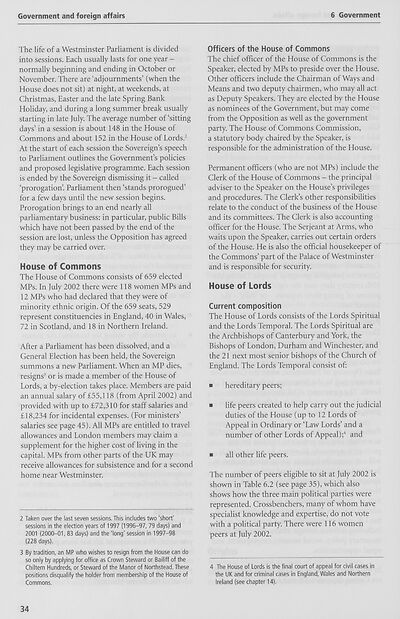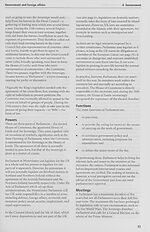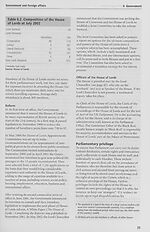Download files
Complete book:
Individual page:
Thumbnail gallery: Grid view | List view

Government and foreign affairs
6 Government
The life of a Westminster Parliament is divided
into sessions. Each usually lasts for one year -
normally beginning and ending in October or
November. There are ‘adjournments’ (when the
House does not sit) at night, at weekends, at
Christmas, Easter and the late Spring Bank
Holiday, and during a long summer break usually
starting in late July. The average number of ‘sitting
days’ in a session is about 148 in the House of
Commons and about 152 in the House of Lords.2
At the start of each session the Sovereign’s speech
to Parliament outlines the Government’s policies
and proposed legislative programme. Each session
is ended by the Sovereign dismissing it - called
‘prorogation’. Parliament then ‘stands prorogued’
for a few days until the new session begins.
Prorogation brings to an end nearly all
parliamentary business: in particular, public Bills
which have not been passed by the end of the
session are lost, unless the Opposition has agreed
they may be carried over.
House of Commons
The House of Commons consists of 659 elected
MPs. In July 2002 there were 118 women MPs and
12 MPs who had declared that they were of
minority ethnic origin. Of the 659 seats, 529
represent constituencies in England, 40 in Wales,
72 in Scotland, and 18 in Northern Ireland.
After a Parliament has been dissolved, and a
General Election has been held, the Sovereign
summons a new Parliament. When an MP dies,
resigns3 or is made a member of the House of
Lords, a by-election takes place. Members are paid
an annual salary of £55,118 (from April 2002) and
provided with up to £72,310 for staff salaries and
£18,234 for incidental expenses. (For ministers’
salaries see page 45). All MPs are entitled to travel
allowances and London members may claim a
supplement for the higher cost of living in the
capital. MPs from other parts of the UK may
receive allowances for subsistence and for a second
home near Westminster.
2 Taken over the last seven sessions. This includes two 'short'
sessions in the election years of 1997 (1996-97, 79 days) and
2001 (2000-01, 83 days) and the Tong' session in 1997-98
(228 days).
3 By tradition, an MP who wishes to resign from the House can do
so only by applying for office as Crown Steward or Bailiff of the
Chiltern Hundreds, or Steward of the Manor of Northstead. These
positions disqualify the holder from membership of the House of
Commons.
Officers of the House of Commons
The chief officer of the House of Commons is the
Speaker, elected by MPs to preside over the House.
Other officers include the Chairman of Ways and
Means and two deputy chairmen, who may all act
as Deputy Speakers. They are elected by the House
as nominees of the Government, but may come
from the Opposition as well as the government
party. The House of Commons Commission,
a statutory body chaired by the Speaker, is
responsible for the administration of the House.
Permanent officers (who are not MPs) include the
Clerk of the House of Commons - the principal
adviser to the Speaker on the House’s privileges
and procedures. The Clerk’s other responsibilities
relate to the conduct of the business of the House
and its committees. The Clerk is also accounting
officer for the House. The Serjeant at Arms, who
waits upon the Speaker, carries out certain orders
of the House. He is also the official housekeeper of
the Commons’ part of the Palace of Westminster
and is responsible for security.
House of Lords
Current composition
The House of Lords consists of the Lords Spiritual
and the Lords Temporal. The Lords Spiritual are
the Archbishops of Canterbury and York, the
Bishops of London, Durham and Winchester, and
the 21 next most senior bishops of the Church of
England. The Lords Temporal consist of:
■ hereditary peers;
■ life peers created to help carry out the judicial
duties of the House (up to 12 Lords of
Appeal in Ordinary or ‘Law Lords’ and a
number of other Lords of Appeal);4 and
■ all other life peers.
The number of peers eligible to sit at July 2002 is
shown in Table 6.2 (see page 35), which also
shows how the three main political parties were
represented. Crossbenchers, many of whom have
specialist knowledge and expertise, do not vote
with a political party. There were 116 women
peers at July 2002.
4 The House of Lords is the final court of appeal for civil cases in
the UK and for criminal cases in England, Wales and Northern
Ireland (see chapter 14).
34
6 Government
The life of a Westminster Parliament is divided
into sessions. Each usually lasts for one year -
normally beginning and ending in October or
November. There are ‘adjournments’ (when the
House does not sit) at night, at weekends, at
Christmas, Easter and the late Spring Bank
Holiday, and during a long summer break usually
starting in late July. The average number of ‘sitting
days’ in a session is about 148 in the House of
Commons and about 152 in the House of Lords.2
At the start of each session the Sovereign’s speech
to Parliament outlines the Government’s policies
and proposed legislative programme. Each session
is ended by the Sovereign dismissing it - called
‘prorogation’. Parliament then ‘stands prorogued’
for a few days until the new session begins.
Prorogation brings to an end nearly all
parliamentary business: in particular, public Bills
which have not been passed by the end of the
session are lost, unless the Opposition has agreed
they may be carried over.
House of Commons
The House of Commons consists of 659 elected
MPs. In July 2002 there were 118 women MPs and
12 MPs who had declared that they were of
minority ethnic origin. Of the 659 seats, 529
represent constituencies in England, 40 in Wales,
72 in Scotland, and 18 in Northern Ireland.
After a Parliament has been dissolved, and a
General Election has been held, the Sovereign
summons a new Parliament. When an MP dies,
resigns3 or is made a member of the House of
Lords, a by-election takes place. Members are paid
an annual salary of £55,118 (from April 2002) and
provided with up to £72,310 for staff salaries and
£18,234 for incidental expenses. (For ministers’
salaries see page 45). All MPs are entitled to travel
allowances and London members may claim a
supplement for the higher cost of living in the
capital. MPs from other parts of the UK may
receive allowances for subsistence and for a second
home near Westminster.
2 Taken over the last seven sessions. This includes two 'short'
sessions in the election years of 1997 (1996-97, 79 days) and
2001 (2000-01, 83 days) and the Tong' session in 1997-98
(228 days).
3 By tradition, an MP who wishes to resign from the House can do
so only by applying for office as Crown Steward or Bailiff of the
Chiltern Hundreds, or Steward of the Manor of Northstead. These
positions disqualify the holder from membership of the House of
Commons.
Officers of the House of Commons
The chief officer of the House of Commons is the
Speaker, elected by MPs to preside over the House.
Other officers include the Chairman of Ways and
Means and two deputy chairmen, who may all act
as Deputy Speakers. They are elected by the House
as nominees of the Government, but may come
from the Opposition as well as the government
party. The House of Commons Commission,
a statutory body chaired by the Speaker, is
responsible for the administration of the House.
Permanent officers (who are not MPs) include the
Clerk of the House of Commons - the principal
adviser to the Speaker on the House’s privileges
and procedures. The Clerk’s other responsibilities
relate to the conduct of the business of the House
and its committees. The Clerk is also accounting
officer for the House. The Serjeant at Arms, who
waits upon the Speaker, carries out certain orders
of the House. He is also the official housekeeper of
the Commons’ part of the Palace of Westminster
and is responsible for security.
House of Lords
Current composition
The House of Lords consists of the Lords Spiritual
and the Lords Temporal. The Lords Spiritual are
the Archbishops of Canterbury and York, the
Bishops of London, Durham and Winchester, and
the 21 next most senior bishops of the Church of
England. The Lords Temporal consist of:
■ hereditary peers;
■ life peers created to help carry out the judicial
duties of the House (up to 12 Lords of
Appeal in Ordinary or ‘Law Lords’ and a
number of other Lords of Appeal);4 and
■ all other life peers.
The number of peers eligible to sit at July 2002 is
shown in Table 6.2 (see page 35), which also
shows how the three main political parties were
represented. Crossbenchers, many of whom have
specialist knowledge and expertise, do not vote
with a political party. There were 116 women
peers at July 2002.
4 The House of Lords is the final court of appeal for civil cases in
the UK and for criminal cases in England, Wales and Northern
Ireland (see chapter 14).
34
Set display mode to:
![]() Universal Viewer |
Universal Viewer | ![]() Mirador |
Large image | Transcription
Mirador |
Large image | Transcription
The item on this page appears courtesy of Office for National Statistics and may be re-used under the Open Government Licence for Public Sector Information.
| Britain and UK handbooks > UK: The official yearbook of the United Kingdom of Great Britain and Northern Ireland > 2003 > (48) |
|---|
| Permanent URL | https://digital.nls.uk/204923731 |
|---|
| Attribution and copyright: |
|
|---|---|
| Description | Three volumes of 'UK: The official yearbook of the United Kingdom of Great Britain and Northern Ireland', published annually by the Office of National Statistics from 2002-2005. |
|---|---|
| Shelfmark | GII.11 SER |
| Description | Three titles produced by the British Government from 1954-2005 describing 'how Britain worked'. They are: 'Britain: An official handbook' (1954-1998), 'Britain: The official yearbook of the United Kingdom' (1999-2001), and 'UK: The official yearbook of the United Kingdom of Great Britain and Northern Ireland' (2002-2005). These 50 reports provide an overview of Britain's economic, social and cultural affairs, its environment, international relations, and the systems of government. They give an impartial summary of government policies and initiatives, and explain how public services are organised. |
|---|---|
| Additional NLS resources: |
|

